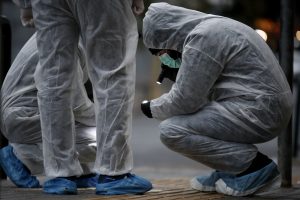So much for parties, clubs and bars. When the late hours strike on a Saturday night, the place to be for more young adults is asleep in bed.
Today’s 18-to-35-year-olds say they understand the link between sleep and health better than people once did, with many seeing the long- and short-term benefits of more shut-eye. Younger people also say they take comfort in seizing control over their bedtime routines, finding solace in saying no to even a late-night dinner.
Businesses have adjusted in turn, with bars adding matinee dance parties and other daytime events.
In 2022, those in their 20s reported getting an average of nine hours and 28 minutes of sleep, according to an analysis of American Time Use Survey data by RentCafe. That is an 8% increase from the eight hours and 47 minutes they said they slept in 2010. Those in their 30s and 40s saw smaller increases.
Bedtimes are also creeping earlier. An analysis of more than two million total Sleep Number smart-bed customers found that those between 18 and 34 went to bed at 10:06 p.m. on average in January, compared with 10:18 p.m. last January.
Emma Kraft, a 19-year-old junior at the University of California, Berkeley, spent her sophomore year living in a sorority house with 65 other women and still managed to clock her nine-hour minimum of shut-eye.
“For me, nothing good happens after 9 p.m.,” says Kraft, who tries to be asleep by around 9:30 every night. Far from feeling like an outsider, Kraft says she has been bombarded with requests from friends for help shifting their own bedtimes earlier.
“All of a sudden, it’s so much cooler and way more accepted to sleep early, and everyone has just adapted,” Kraft says.
Party, but make it daylight
Madelyn Sugg, 25, adopted a loose 9 p.m. bedtime after moving to Tulsa, Okla., in November. Instead of barhopping into the wee hours like she often had on weekends, Sugg says she now sees a jazz show with one group of friends at 6 p.m. every Monday and grabs drinks with another group at 5 p.m. on Thursdays.
“I was afraid of that feeling of FOMO or of feeling like I’m not succeeding at building a community, but it’s actually turned out to be an improvement in all these areas,” says Sugg, a financial-operations analyst.
She says the shift is saving her hundreds of dollars a month on late-night food and drinks.
Businesses used to welcoming night owls are reporting this change of behavior, too.
Seatings between 4 p.m. and 6 p.m. now make up 31% of Yelp reservations, up from 19% in 2017. The proportion of reservations between 6 p.m. and midnight have declined in tandem.
In New York City, bars are experimenting with early dance parties for those who want to get down during daylight hours. Joyface in the East Village has hosted four “matinees” since Halloween that start at 5 p.m. On New Year’s Eve, revelers counted down to 2024 at 8 p.m. The wait list that night was 200 people long, owner Jennifer Shorr says.
“We order pizza for everyone, it peaks at 8 p.m., then everyone can still be in bed by 11,” she says.
John Winkelman says he has seen sleep swing from a long-snubbed facet of medicine to an occasionally overhyped cure-all in his 30 years in the field. The chief of the sleep disorders clinical-research program at Massachusetts General Hospital in Boston says he is happy to see more people taking their sleep seriously, but says there is such a thing as too seriously.
“People are getting a little bit neurotic about it,” he says.
He doesn’t see any intrinsic benefit to turning in earlier “unless you have to wake up at 3 a.m.,” but touts the benefits of a consistent bedtime and getting somewhere between seven and nine hours.
Work-from-home effect
Will and Kelsey Tjernlund say they laugh and sometimes decline if friends invite them out to an 8 p.m. dinner on a Friday.
“We’re, like, ‘Oh my gosh, that’s so late,’” says 33-year-old Will, who runs an e-commerce consulting business from the couple’s home in Austin, Texas, and is usually in bed by 8:30.
It is a big departure from their lifestyle before the pandemic, when 30-year-old Kelsey worked in an office downtown and got home around 7 p.m. Now, the Tjernlunds work out during their lunch breaks and fold laundry and prep dinner in the afternoons.
Kelly Baskin, a voice actor in Los Angeles who also works from home, says embracing an early bedtime was about saying no to hustle culture and accepting that she requires a full nine hours of sleep.
“I always thought that made me look lazy and I tried to fight it,” says Baskin, 32.
Baskin, who tries to be in bed between 8 and 9 every night, says a de-stigmatization of early bedtimes on social media helped motivate her.
“A third of my For You page right now is people going to bed early,” she says of her TikTok feed.
The videos are part of the #SoftGirl trend that highlights slow-paced indoor activities like journaling, sipping a cup of tea or performing a calming nighttime wind-down routine. Videos with the hashtag have been viewed a collective 2.9 billion times on TikTok.
Kraft, the Berkeley junior, says some events on campus are starting earlier than they did when she was a freshman. But not everything.
“The fraternities, I would say, have not quite caught onto the trend,” she jokes.
Write to Rachel Wolfe at rachel.wolfe@wsj.com



